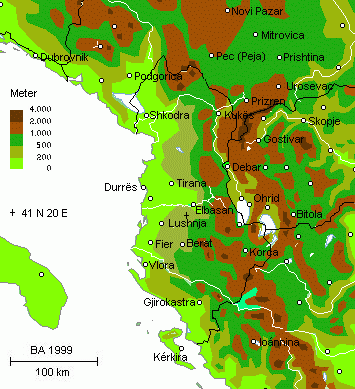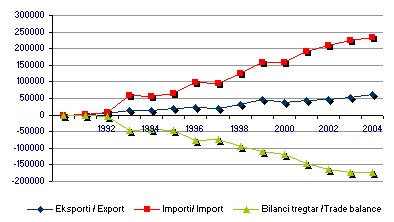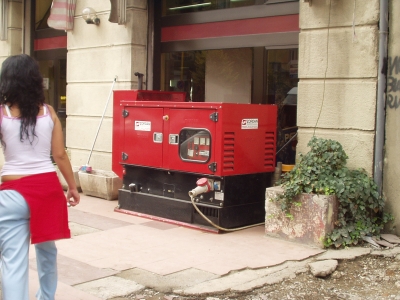Elektricitetsproduktion og -forbrug
Electrical energy supplied during the first half-year 2005 increased by 6.5 percent compared with the same period of the previous year. The quantity supplied was 3,671GWh. The domestic production during this period covered 88.8 percent of the electrical energy supplied. This quantity produced increased with 4 percent compared with the first half-year 2004. This increase was a consequence of a higher production of HEC and TEC. The monthly average of the domestic production was 543 GWh. Import of electric power (including exchanges) covered 11.2 percent of the electrical energy supplied. Compared with the respective half-year of the previous year it indicated an increase of 31.4 percent. The monthly average of the imported electric power reached 68.7 GWh. Losses in network decreased with 3.3 percent compared with the respective period of 2004.This losses make up 33.3 percent of the electric energy used in the first half-year. Losses caused by distribution are 86.8 percent of the total losses in network. The use of electric power by domestic users slightly increased with 0.9 percent. The domestic use constitute 51.2 percent of the total uses for the first half-year.
The domestic production of electric power during the first half-year was 3,259 GWh. The quantity produced rose with 4 percent compared with the first half-year of 2004 and 13.4 percent compared with the same period in 2003. Despite this, the domestic production covered 85.8 percent of the total electrical energy supply, differently from the same period of 2004, where the production consisted in 90.9 percent of the electrical energy supplied.
HEC continues to perform an important role in domestic production of electric power. The quantity produced by them reached the quantity of 3,220 GWh, composing so 98.8 percent of the total production in country. The deficiency created from the lack of production from local HEC is compensated with the production doubled by HEC Smokthina.
TEC during this period produced 38.4 GWh that compose 1.2 percent of the domestic quantity produced. Compared with the first half-year of 2004 the quantity produced by them rose with 1.8 percent.
TOTAL SUPPLY WITH ELECTRICAL ENERGY
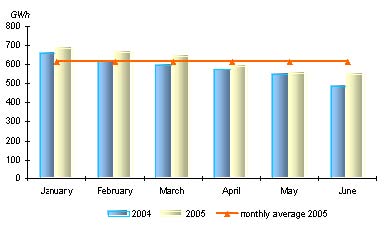
Import of electric power (included exchanges) showed an increase with 31.4 percent compared with the respective period of 2004. This import is fully covered from the exchange process of the energy. This quantity is 412 GWh composing so 11.2 percent of the total supply with electrical energy. The monthly average supply of this flux was 68.6 GWh.
Export of electric power (included exchanges) is doubled compared with the first half of 2004 achieving the quantity of 512 GWh. The quantity exported consists of 13.9 percent of the quantity supplied and is fully considered as outflow from the energy exchanged. The exported monthly average quantity is 56.8 GWh.
IMPORTI AND EXPORTI OF ELECTRICAL ENERGY
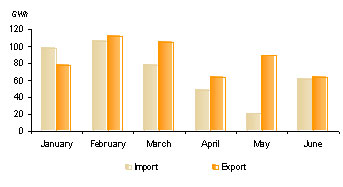
Losses in network decreased with 3.3 percent compared with the same period of the previous year. The quantity lost composed 33.3 percent of the total electric power supply. Losses in distribution are still an important component of the total lose in network, covering so 86.8 percent of it. . As in the previous year January was the month, which indicated the highest losses. The daily average of losses is 6.7 GWh or 36.8 percent lower than the first half-year of 2004.
LOSSES IN NETWORK OF ELECTRIC POWER
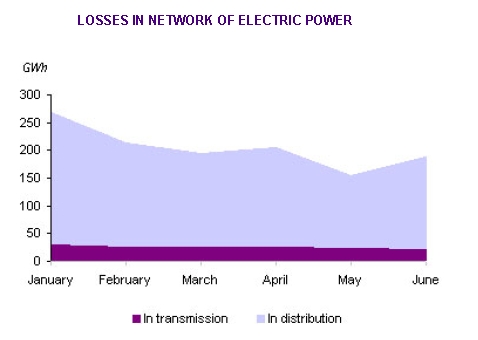
Use of electric power by domestic users indicated a slight increase with 0.9 percent compared with the first half-year in 2004.The quantity used was 1,880 GWh and make up 51.2 percent of the total supply. The daily average use for this period is 20.3 GWh or 7.4 percent higher than the first half-year of 2004.
The residential sector continues to be the main consumer of electric power. In the first half of 2005 household consume composed 58.9 percent of the quantity used by domestic users.
During this period the quantity consumed by the households decreased with 3.4 percent compared with the respective period of the previous year and 4.5 percent compared with the first half-year in 2003. The monthly average quantity of household consumption in the first half of 2005 is 184 GWh and the daily average is 6.1 GWh. The monthly average of the quantity consumed by households in the first half-year of 2004 was 191 GWh and daily average was 6.3 GWh.
USE OF ELECTRICAL ENERGY FROM USERS
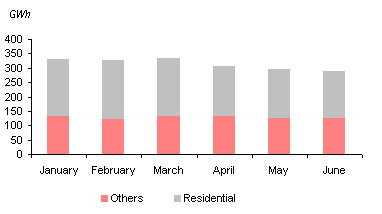
SERBIEN og MONTENEGRO. SERBIEN (alene)
Det Amerikanske UM har Juli 2004 offentliggjort en 'Background Note' om Serbien - Montenegro: http://www.state.gov/r/pa/ei/bgn/5388.htm ... Det Engelske Udenrigsministeriums 'Country Advice' til rejsende kan findes på adressen: http://www.fco.gov.uk/servlet/Front?pagename=OpenMarket%2FXcelerate%2FShowPage&c=Page&cid=1007029390590&a=KCountryAdvice&aid=1013618386622 ... En biografi over tidligere Forbundspræsident Kostunica kan læses på Serbiske Politikere ...
Mht ICTYs sag mod tidligere Præsident Milosevic, se (evt.) under ICTY ovenfor.
Præsidentvalg i Serbien. Boris Tadic blev i Juni 2004 valgt som Præsident. Seneste Parlamentsvalg: 031228.
Kosovo / Kosóva:
MONTENEGRO (alene)
Præsidentvalg 030511: Filip Vujanovic blev valgt. Seneste Parlamentsvalg 021020.
MAKEDONIEN
Det Engelske Udenrigsministeriums 'Country Advice' til rejsende kan findes på adressen: http://www.fco.gov.uk/servlet/Front?pagename=OpenMarket%2FXcelerate%2FShowPage&c=Page&cid=1007029390590&a=KCountryAdvice&aid=1013618386163 ... Det Amerikanske UM har Maj 2004 offentliggjort en 'Background Note' om Makedonien: http://www.state.gov/r/pa/ei/bgn/26759.htm
Der er omkring 25 % etniske Albanere i Makedonien. Folketælling afholdtes 021101-021105.
Præsidentvalg i Maj 2004: Branko Crvenkovski - hidtidig PM - blev valgt (efter Boris Trajkovski som omkom ved en flyulykke). Seneste Parlamentsvalg fandt sted 020915. Der kan henvises til flg. OSCE/ODIHR-oversigtsside: http://www.osce.org/odihr/elections/field_activities/skopje2002/.
Folkeafstemningen 041107 om decentralisering (= imødekommelse af Makedonien-Albanske interesser): Folkeafstemningen "faldt". Stemmedeltagelsen var kun omkring 26 %. Hvis afstemningen skulle have kunnet udvirke en ændring af decentraliseringslovgivningen, skulle deltagelsen have været mindst 50%, og desuden skulle der have været flertal mod lovgivningen. Det var ventet at stemmedeltagelsen ville have været noget større, selv om både Regeringspartierne og den Albanske minoritet anbefalede at man blev hjemme. Man kan nu gå videre i overensstemmelse med Ohrid-aftalerne.
Jernbanetransport. Verdensbanken skriver i September:
Washington, September 15, 2005 - The World Bank today approved a EUR15 million for the Railways Reform project for FYR Macedonia. This project will facilitate the government’s efforts to reform Macedonian Railways and improve its productivity and effectiveness.
FYR Macedonia’s strategic location puts it at the center of international routes linking Turkey, Greece, and Bulgaria to the rest of Europe. Efficient and effective operation of the roads and railways, which link FYR Macedonia to the region, will become increasingly important to realizing the country’s growth potential.
Macedonian Railways, which operates the country’s railways, is one of the largest loss-making companies among public sector enterprises. Total debt at the end of year 2004 was €143 million (3.3% of GDP). It is estimated that if the railways are not subject to major reforms, the cost to the government will increase by another €100 million to cover operating losses over the next ten years.
The Government recognizes that an efficient transport sector would contribute to economic growth and has partnered with the World Bank in a project that will help to progressively transform the country’s railways into an economically viable entity, prepare for privatization, and establish regulatory competence for a multiple operator market. The reform should lead to focused management and better accountability and, with labor restructuring, streamlined operational and financial performance, and targeted investments, the railways are expected to show a marked improvement in performance.
The Railways Reform project has four main components. The first component will provide for the technical assistance needed to complete the first phase of restructuring, including separation of operations from infrastructure and preparing for the privatization of Macedonian Railways and establishing a regulatory framework.
The second component will provide a variety of employment services to retrenched staff, such as social and financial counseling, one-on-one consultation with the retrenched staff to determine the most appropriate training needs; and facilitating staff training by providing a voucher to interested retrenched staff to be used for the training of his/her choice in selected institutions. The third and the fourth component will include procurement, installation, remanufacturing and retrofitting of locomotives, wagons, track maintenance and other equipment needed for the normal functioning of the company.
FYR Macedonia joined the World Bank in 1994. Since then, commitments to the country total more than US$650 million.
GRÆKENLAND
Seneste Parlamentsvalg 040307. Olympiade 13.-29. August (se Græsk side: http://www.athens2004.com/athens2004/ og Dansk side: http://www.dif.dk/index/ol-3/ol-ol2004.htm).
Aktuelle Græske problemområder:
- Delingen af Cypern. Relationerne til Tyrkiet herom.
- Tyrkiet's evt. optagelse i EU. Grækerne er ambivalente.
- Makedonien. Den Græske Regering kan ikke acceptere at Makedonien officielt kaldes sådan.
- Albanien: Cam-problemet - se nedenfor.
- Nogle hundredetusinde Albanere bor og arbejder i Grækenland. En del har boet i Grækenland i generationer og er Græske Statsborgere. Mange er Albanske Arbejdere med arbejdstilladelse osv. Mange er imidlertid kommet illegalt til Grækenland; en del af dem er kriminelle.
Den Græske Præsident - Karolos Papoulias - har været på et besøg der blev kortere end aftalt. En Albansk demonstration ved det Græske Konsulat i Saranda blev taget ilde op og har givet anledning til at den Græske Præsident returnerede til Athen uden at mødes med Præsident Moisiu. Se under: Albanien.
Græske skoler i Albanien. ADN skrev 15.10.:
Back from a visit in Athens, the leader of the Union for Human Rights Party, Vangjel Dule, greeted the declaration of Minister Mustafaj in favor of opening Greek schools in Albania and promised opening of Albanian schools in the neigbouring country. The stance of the new Albanian government towards opening Greek schools in the areas inhabited by minorities will be followed by the opening of a number of schools in Albanian in Greece.
Trafikulykke med Albansk deltagelse. Kathimerini skriver:
6 die in single Halkidiki crash
On a weekend that saw heavier traffic conditions on the country’s highways due to Friday’s national holiday, six people were killed in a single car accident in Halkidiki, northern Greece.
Police said that early yesterday morning a vehicle carrying five people was involved in a head on collision with another car in Nea Moudania.
The five people in the one car were all Albanian nationals, while the driver of the second car was Greek.
Police are conducting an investigation into the causes of the accident.
In a separate accident that occurred nearby in Halkidiki on Saturday, a 45-year-old woman was killed when the vehicle she was driving veered into the opposite lane and hit an oncoming car.
The driver of the other vehicle was slightly injured.
Traffic authorities estimate that some 300,000 Athenians left the city over the weekend, taking advantage of the long weekend.
ATA skrev 5.10. om menneskesmugling fra Albanien til Grækenland: Three citizens carrying clandestines toward Qafebote, boarding point with Greece were stopped on Tuesday In the national roadway Sarande-Gjirokaster, at a place called Kraneja Bridge. Official sources of the Fight against Trafficking Office in Sarande, told ATA on Wednesday the citizens arrested were Bilbil Sula, aged 35, Dilaver Bega, aged 49, and Gramoz Kuçuku, aged 50. ... Der var ca. 10 Mennesker i hver bil.
Kathimerini har en anden historie om menneskesmugling:
Police said on Saturday that they had arrested two Greeks and an Albanian national in Orestiada, close to the Greek-Turkish border, who were transporting 15 illegal immigrants, all from Pakistan. The men were transporting the migrants via three cars for a fee, police said.
Energisk Albansk Røver i Attica dræbt i skudveksling med Politiet. Kathimerini skriver:
A 25-year-old Albanian, killed in Ambelokipi on Wednesday in a police shootout, had taken part in more than 40 armed robberies and two attempted homicides in Attica over the past two years, officers said yesterday.
Festim Likai (also known as Christo Gouma) had headed a gang that has netted more than 300,000 euros from raids on banks and stores, according to police. The 4,100 euros found in Likai’s pockets after Wednesday’s shootout were the proceeds of a raid earlier that day on a bank in Brahami, officers said.
Using Likai’s fingerprints, police determined his participation in 18 bank robberies, 20 store raids and four car heists (twice Likai fired at the drivers, without injuring them).
Police traced Likai from information gleaned following the arrests of a 21-year-old Albanian in Parga and an 18-year-old in Athens earlier this week.
Police said they fired at Likai in self-defense after he shot at them four times upon leaving his apartment.
Kriminaliteten i Attica. Kathimerini skriver:
Siren sounds over police presence
Greece’s most crime-ridden area, Attica, is experiencing severe police shortages due to red tape and a lack of trained personnel, leaving the force short by some 4,000 officers, according to figures seen by Sunday’s Kathimerini.
The Attica Police Department (APD) should be operating with a minimum of 19,716 staff, a government study has decreed, so that the force can meet its policing duties. Instead, there are 16,814 officers currently serving in the area and almost 1,000 more have been assigned to a number of other duties or forces, leaving the APD suffering a staff shortage of around 20 percent.
The lack of personnel in Attica is a particularly sensitive issue, as almost 90 percent of the crimes reported each year in Greece take place in and around Athens.
Meanwhile, more than a year on from the Olympics, the number of officers on the streets has dropped and figures suggest that criminals have been taking advantage.
Since the center of the capital is the most crime-ridden area of the city, police chiefs are attempting to make up for the lack of officers by drafting in personnel from police stations in the suburbs. This, in turn, is leaving the outer areas of Attica very weak in terms of police presence and capabilities, sources told Sunday’s Kathimerini.
The shortage in police numbers is mainly being put down to a slow intake of new recruits and the bureaucratic obstacles of the current system, which means that officers are often called in to perform other duties.
Some 1,800 officers, for example, are involved in carrying out tasks such as taking noise recordings at nightclubs and chasing up violations of building regulations. Police chiefs argue that these jobs could be handled by local authority officials.
2' Verdenskrig. Forholdet til Italien og Tyskland. Kathimerini skriver:
Early 1941, a time of grim realization.
Greater sacrifices than in the war with Italy were looming for Greece with an overwhelming and far deadlier enemy on a second front
By early 1941, it had become apparent that Greece’s defeat of Italian troops on the Albanian front would not put an end to Greece’s participation in World War II. German troops began to concentrate in Bulgaria, massing on the border with Greece, and it was clear that an invasion of Greece was imminent.
This was a time of grim realization in Greece, realization that the sacrifices in the war against Italy would soon be overwhelmed by the demands of a war against an overwhelming and far deadlier enemy on a second front.
Georgios Angelou Vlachos, the publisher who founded Kathimerini in 1919, summed up many of the feelings and arguments of his countrymen when he addressed an open letter to Adolf Hitler on the front page of Kathimerini on March 8, 1941. Vlachos pointed out at length how hard Greece had tried to stay out of the war, trying to heal its wounds from continual conflict abroad and domestic divisions. He stressed that even when — unprovoked — an Italian submarine sank a Greek cruiser, the Elli, in the port of Tinos on August 15, 1940, Greece turned the other cheek, so as to avoid war. But the Italian ultimatum on October 28, 1940, forced Greece to take a stand, and it turned to its only ally, Britain, for assistance. Even then, the Greeks limited Britain’s assistance, Vlachos argued, so as not to provoke Germany into a response.
And yet, he noted, the Germans prepared to invade a Greece that was exhausted but still ready to stand and fight. After arguing as to why it would not make sense for Germany to attack Greece, Vlachos ended his letter with the solemn assertion that Greece would fight in Thrace as it had fought in Epirus and, “This land that taught the world how to live will now teach it how to die.” The words were prophetic. The German invasion and occupation, which ended in the fall of 1944, sowed death through hostilities and starvation across the country. It left a nation divided between left- and right-wing forces and led to the devastating civil war in 1946-49. It took Greece many years to heal the wounds from this conflagration. Below is Vlachos’s letter, which offers precious insight into the thoughts and fears, and desperate heroism, that beset Athens as the storm clouds gathered.
TYRKIET
UMs rejsevejledning: http://www.um.dk/da/menu/Borgerservice/FoerRejsen/Rejsevejledninger/RejsevejledningTyrkiet.htm.
Seneste Parlamentsvalg blev holdt 021103. Det blev i December 2004 aftalt (med EUs Regeringschefer)at der i Oktober 2005 skal indledes forhandlinger om optagelse af Tyrkiet i EU.
LANDE UDEN FOR BALKAN OG ØSTLIGE MIDDELHAV. NATO-LANDE
ITALIEN
Mother Teresa. I anledning af saligkåringen ('beatificeringen') 031019 har Vatikantet etableret en internetside: http://www.vatican.va/news_services/liturgy/saints/ns_lit_doc_20031019_index_madre-teresa_en.html
USA

Forslag om en Scanderbeg-resolution. Flg. er modtaget fra Albanian American Civic League:
CONGRESSMEN ROHRABACHER AND LANTOS INTRODUCE CONGRESSIONAL RESOLUTION TO HONOR THE 600TH ANNIVERSARY OF THE BIRTH OF GJERG CASTRIOTI SCANDERBEG
WASHINGTON, OCTOBER 28, 2005—Today, at the urging of the Albanian American Civic League, House International Relations Committee Member Dana Rohrabacher (R-CA) and Tom Lantos (D-CA), the Committee’s Ranking Democrat, introduced a Congressional Resolution honoring the 600th anniversary of the birth of Gjergj Castrioti (Scanderbeg)—the fifteenth century Albanian statesman, diplomat, and military genius who is a national hero to Albanians in the Balkans and throughout the world.
With the help of several Albanian professors, Civic League President Joe DioGuardi and Balkan Affairs Adviser Shirley Cloyes DioGuardi provided the research to convince Rohrabacher and Lantos to introduce a Congressional Resolution commemorating on October 28, 2005, the many achievements (listed in the resolution) of Gjergj Castrioti Scanderbeg. The Resolution concludes with the House of Representatives urging the Bush administration to “work with its European partners to accelerate the integration of Albania and a free Kosova into the European Union, in recognition of the great contributions and sacrifice made by Gjergj Castrioti and the Albanian people in saving Western Europe from Ottoman domination.” This follows an account of Scanderbeg’s life and the occupation that the Albanian people endured for 425 years after Scanderbeg’s death, ending on November 28, 1912, with the raising of the Albanian flag by Ismail Qemali over a free Albania, including Kosova and the Albanian lands of Macedonia, Montenegro, Presheva, and Chameria.
Joe DioGuardi stated that, “Castrioti is the leading figure of the many great historical heroes of the Albanian people. Albanians can rightly be proud of their illustrious history and heritage, beginning in modern times with Gjergj Castrioti and continuing into the 21st century with Blessed Mother Teresa.” DioGuardi added that, “In between, to name just two other great figures, we cannot forget the wisdom, courage, and love of the Albanian national cause of Ismail Qemali and Bishop and Prime Minister Fan Noli. We must continue to honor these heroes and their prodigious efforts to free all Albanians, if we are to keep faith (besa) with the Albanian people today and in future generations.”
According to Shirley Cloyes DioGuardi, “the introduction of a Congressional Resolution honoring Scanderbeg is an important contribution to educating America about the role
that Albanians have played in shaping Western history. Scanderbeg’s struggle against Ottoman occupation and oppression for twenty-seven years safeguarded Western Europe and laid the groundwork for its development into a body of free and democratic states.” Cloyes added that, “On the eve of Kosova’s final status talks, the Rohrabacher-Lantos Resolution is also a timely and important reminder that resolving the Albanian national cause, which Scanderbeg founded, is essential to bringing lasting peace to a whole, undivided, and unified Europe.”
109th CONGRESS H.RES. 522 1st SESSION
Honoring the 600th anniversary of the birth of Gjergj Castrioti (Scanderbeg), statesman, diplomat, and military genius, for his role in saving Western Europe from Ottoman occupation.
IN THE HOUSE OF REPRESENTATIVES
Mr. ROHRABACHER (for himself and Mr. LANTOS) submitted the following resolution;
which was referred to the Committee on International Relations on October 28, 2005
RESOLUTION
Whereas six hundred years ago, in 1405 AD, in the White Castle of Kruja (formerly Croya), Albania, Gjergj Castrioti was born;
Whereas at the age of 17 his father reluctantly left him with the Ottoman Turkish Sultan as a condition of peace;
Whereas Castrioti excelled in studying history and classical languages and at an early age reached the rank of General in the Ottoman Turkish Army;
Whereas Castrioti’s military genius and unique leadership qualities were praised by Sultan Murad, who called him Iskander Bey (now Scanderbeg), after Alexander the Great;
Whereas, while being away from his native Albanian lands, Castrioti never forgot his Albanian heritage and people;
Whereas on October 28, 1443, after much soul-searching and in utmost secrecy, Castrioti finally decided to return home and liberate the Albanian people from Ottoman domination;
Whereas the Battle of Nish on November 10, 1443, between Ottoman troops and the Hungarian Army (led by another freedom-fighter, Janos Hunyadi), gave Scanderbeg the perfect opportunity to accomplish his plan of return;
Whereas on November 28, 1443, Scanderbeg returned to his native town of Kruja and raised again his flag with the double-headed eagle over the White Castle there to the enthusiastic celebration of his people, an historical moment vividly described by the American poet Henry Wadsworth Longfellow in his lengthy epic poem, “Scanderbeg”;
Whereas Scanderbeg thereafter successfully defended the Albanian people against countless attacks by the Ottoman Empire, the largest army of the period, including in 1450 the onslaught of more than 150,000 Ottoman troops led by Sultan Murad, who was ultimately defeated by vastly outnumbered Albanian foot soldiers and cavalry led by Scanderbeg at the Castle of Kruja in a bloody Homeric struggle;
Whereas Murad’s son, Sultan Mehmed, conquered Constantinople in 1453, thus ending the Byzantine period, but was unable in 1466 and 1467 to conquer Albania, even though he commanded the largest army of the time, including up to 300,000 foot soldiers and horsemen;
Whereas, during 1460 and 1461, Gjergj Castrioti Scanderbeg brought his army to southern Italy for the second time to defend his ally, King Alphonse of Naples, against the invasion of the Lombards of southern France;
Whereas Gjergj Castrioti united the Albanian people and established a free state of Albania, which endured for 25 years;
Whereas according to Major General James Wolfe, commander of the British army at Quebec, “Scanderbeg… excels all officers, ancient and modern, in the conduct of a small defensive army….”; and, according to noted British historian Edward Gibbon, “the enthusiasm of chivalry and religion has ranked the Albanian prince with the names of Alexander the Great and Pyrrhus”;
Whereas Scanderbeg died at the town of Lyssus (now Lezha), Albania, on January 17, 1468, and Albanians resisted Ottoman occupation for another 20 years, after which the Ottomans overran Albania, forcing tens of thousands of Albanians to flee across the Adriatic Sea to the Kingdom of Naples for asylum, where their progeny still live today;
Whereas the nation of Albania under Scanderbeg prevented the invasion of Rome and all of Italy by the Ottoman Empire, thus effectively paving the way for the Italian Renaissance;
Whereas statues of Scanderbeg mounted on his stallion with sword in hand today grace the capitals of Italy, Austria, Hungary, Albania, and Kosova;
Whereas Albania, including Kosova, became free again on November 28, 1912, after 425 years of Turkish Ottoman occupation, and today modern Albania and Turkey are both staunch allies of the United States of America; and
Whereas the Republic of Albania today is resolute in joining NATO and the European Union as promptly as possible: Now, therefore, be it
Resolved, That the House of Representatives —
(1) commemorates on this day of October 28, 2005, the achievements of Gjergj Castrioti Scanderbeg;
(2) commends Albanians everywhere for paying tribute to and honoring their valiant leader, hero, and son, Gjergj Castrioti; and
(3) urges the United States government to work with its European partners to speed up the integration of Albania and a free Kosova into the European Union in recognition of the great contribution and sacrifice made by Gjergj Castrioti and the Albanian people in saving Western Europe from Ottoman domination.
ENGLAND
TYSKLAND
FRANKRIG
DANMARK (NORGE, SVERIGE)
Ugerapport fra Dansk KFOR. Hærens Operative Kommando - se under: Kosova.
LANDE UDEN FOR BALKAN OG ØSTLIGE MIDDELHAV. IKKE NATO-LANDE
RUSLAND
UMs Rejsevejledning: http://www.um.dk/da/menu/Borgerservice/FoerRejsen/Rejsevejledninger/RejsevejledningRusland.htm
KINA
Du må citere hvis du angiver hovedsidens adresse: bjoerna.dk ... Siderne om Albanerne: bjoerna.dk/albanerne.htm ... Søgning på internettet: bjoerna.dk/soegning.htm



